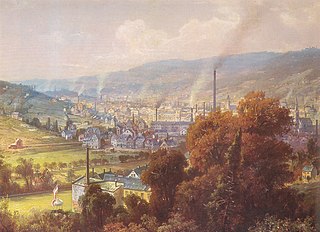Other years |
| Countries of the United Kingdom |
| Scotland |
| Sport |
| 1775 English cricket season |
Events from the year 1775 in Great Britain .
Other years |
| Countries of the United Kingdom |
| Scotland |
| Sport |
| 1775 English cricket season |
Events from the year 1775 in Great Britain .

James Watt was a Scottish inventor, mechanical engineer, and chemist who improved on Thomas Newcomen's 1712 Newcomen steam engine with his Watt steam engine in 1776, which was fundamental to the changes brought by the Industrial Revolution in both his native Great Britain and the rest of the world.

The 1770s was a decade of the Gregorian calendar that began on January 1, 1770, and ended on December 31, 1779. A period full of discoveries, breakthroughs happened in all walks of life, as what emerged at this period brought life to most innovations we know today.

1836 (MDCCCXXXVI) was a leap year starting on Friday of the Gregorian calendar and a leap year starting on Wednesday of the Julian calendar, the 1836th year of the Common Era (CE) and Anno Domini (AD) designations, the 836th year of the 2nd millennium, the 36th year of the 19th century, and the 7th year of the 1830s decade. As of the start of 1836, the Gregorian calendar was 12 days ahead of the Julian calendar, which remained in localized use until 1923.

1775 (MDCCLXXV) was a common year starting on Sunday of the Gregorian calendar and a common year starting on Thursday of the Julian calendar, the 1775th year of the Common Era (CE) and Anno Domini (AD) designations, the 775th year of the 2nd millennium, the 75th year of the 18th century, and the 6th year of the 1770s decade. As of the start of 1775, the Gregorian calendar was 11 days ahead of the Julian calendar, which remained in localized use until 1923.

1769 (MDCCLXIX) was a common year starting on Sunday of the Gregorian calendar and a common year starting on Thursday of the Julian calendar, the 1769th year of the Common Era (CE) and Anno Domini (AD) designations, the 769th year of the 2nd millennium, the 69th year of the 18th century, and the 10th and last year of the 1760s decade. As of the start of 1769, the Gregorian calendar was 11 days ahead of the Julian calendar, which remained in localized use until 1923.

Thomas Newcomen was an English inventor who created the atmospheric engine, the first practical fuel-burning engine in 1712. He was an ironmonger by trade and a Baptist lay preacher by calling.
The year 1775 in science and technology involved some significant events.

Earl Bathurst, of Bathurst in the County of Sussex, is a title in the Peerage of Great Britain.
Steam power developed slowly over a period of several hundred years, progressing through expensive and fairly limited devices in the early 17th century, to useful pumps for mining in 1700, and then to Watt's improved steam engine designs in the late 18th century. It is these later designs, introduced just when the need for practical power was growing due to the Industrial Revolution, that truly made steam power commonplace.

Textile manufacture during the British Industrial Revolution was centred in south Lancashire and the towns on both sides of the Pennines in the United Kingdom. The main drivers of the Industrial Revolution were textile manufacturing, iron founding, steam power, oil drilling, the discovery of electricity and its many industrial applications, the telegraph and many others. Railroads, steamboats, the telegraph and other innovations massively increased worker productivity and raised standards of living by greatly reducing time spent during travel, transportation and communications.

The Proclamation of Rebellion, officially titled A Proclamation for Suppressing Rebellion and Sedition, was the response of George III to the news of the Battle of Bunker Hill at the outset of the American Revolution. Issued on 23 August 1775, it declared elements of the American colonies in a state of "open and avowed rebellion". It ordered officials of the empire "to use their utmost endeavours to withstand and suppress such rebellion". The 1775 proclamation of rebellion also encouraged subjects throughout the empire, including those in Britain, to report anyone carrying on "traitorous correspondence" with the rebels to be punished.
Events from the year 1801 in the United Kingdom. The Acts of Union 1800 came into force this year.

1776 (MDCCLXXVI) was a leap year starting on Monday of the Gregorian calendar and a leap year starting on Friday of the Julian calendar, the 1776th year of the Common Era (CE) and Anno Domini (AD) designations, the 776th year of the 2nd millennium, the 76th year of the 18th century, and the 7th year of the 1770s decade. As of the start of 1776, the Gregorian calendar was 11 days ahead of the Julian calendar, which remained in localized use until 1923.
Events from the year 1819 in the United Kingdom.
Events from the year 1797 in Great Britain.
Events from the year 1776 in Great Britain.
Events from the year 1782 in Great Britain. The American Revolutionary War draws to a close.
Events from the year 1765 in Great Britain.
Events from the year 1769 in Great Britain. This year sees several key events in the Industrial Revolution.
Charles Atherton was a British scientific engineer from Calne, Wiltshire. He was appointed as Chief Engineer and Inspector of Steam Machinery at Her Majesty's Woolwich Dockyard in 1847; and a second time between 1851 and 1862. He served in the same capacity at Her Majesty's Devonport Dockyard between 1848 and 1851.